Jimmer Fredette: ‘I was definitely probably a little bit ahead of my time’
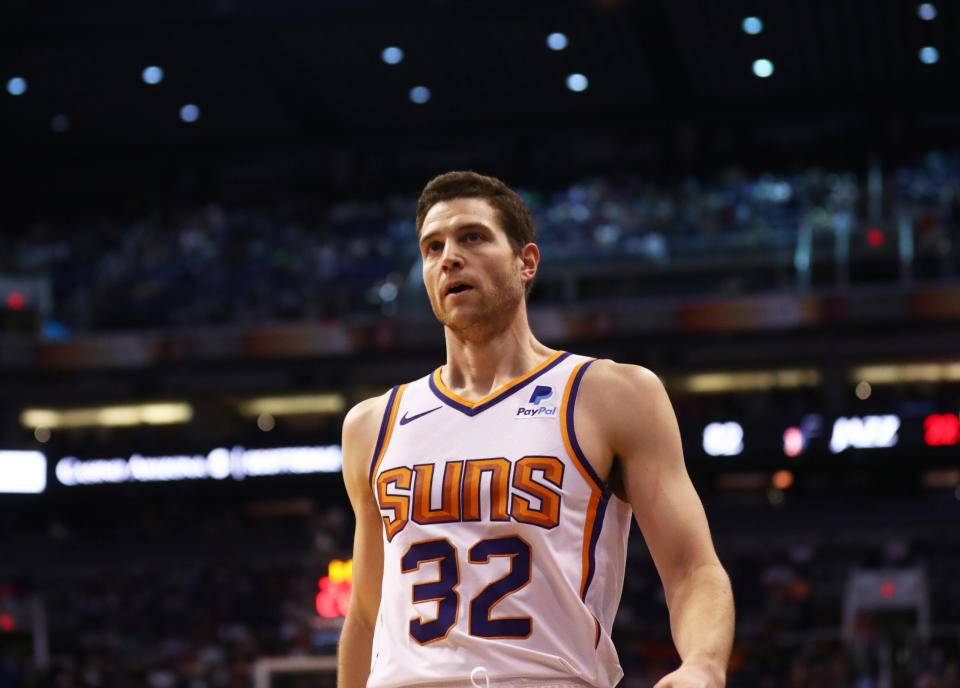
Drafted 10th overall by the Sacramento Kings, Jimmer Fredette spent the first five years of his career trying to find his footing in the NBA. The sharpshooter went overseas to China, and learned to adapt his entire mindset to building a career outside the NBA.
Now in the twilight of his career, the 2011 National Player of the Year is hoping to add a new accomplishment to his resume: a gold medal in the Paris Olympics playing 3-on-3 basketball. Fredette recently returned to Sacramento to play in the 3-on-3 International Cup. He sat down with HoopsHype to discuss his time in Sacramento, playing overseas in China, when he decided to give up his NBA dreams, and more.
What is it like to be back in Sacramento?
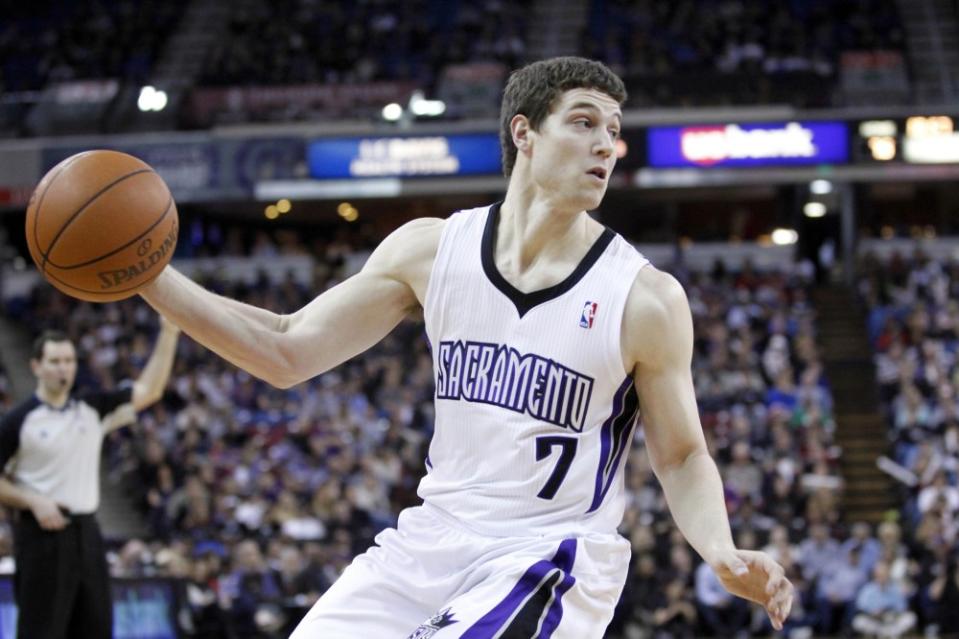
Jimmer Fredette: Yeah, it’s been great. It’s been a lot of fun to be able to kind of come through and see all the old places that I love and know about and I have family out here, enjoying and just coming to the old practice facility, and practicing here tonight, just bringing back all the memories of three years while I was playing here. Such a fun, fun thing to be able to look back on and talk about and just love my time in Sacramento and the people that were here and how they treated me and my family. So it was awesome.
Have you been back in Sacramento over the years?
JF: Yeah. I have. I’ve been back here a few times. I’ve played at the Golden One Center a few times. I came back and played with the Phoenix Suns after a couple of years in China. Came back and played in the new arena, which was really, really cool and been back a few other times as well for some other things. So it’s always good back. I haven’t been back in a few years since then. So it’s good to see how lively downtown is and all the stuff that they have going on here. It’s really cool.
When and why did you start getting involved with 3-on-3 competition?

JF: The biggest thing [was] I had a call with Fran Fraschilla about a year ago at this point, maybe a little over a year and he was talking to me about 3-on-3 because it’s an Olympic sport and he’d be like, ‘Hey, we’re trying to qualify for the Olympics. You’re not playing overseas right now. Would you wanna help us do that?¡ And as soon as I heard Olympics, I was in.
For me to be able to play in the Olympics, play basketball in the Olympics would be an incredible experience. And because of that, we’ve been able to plan the world tour this last year, this whole summer and been all over the world and it’s been really a fun experience to have the guys that we have and build the camaraderie, but then be able to see all these cool places. But yeah, it started with Fran and talking about the Olympics and trying to qualify for that.
So let’s say you do end up participating in the Paris Olympics, and accomplish your goal. Do you wanna go back to 5-on-5 competition or do you want to stay competing in 3-on-3 competition?
JF: I don’t know at this point, to be honest with you, I haven’t really thought about it yet. I mean, I’m 34. By the time the Olympics is done, I’ll be 35 years old and then at that point, who knows what’s gonna happen. It’s a little bit further down the road at this point. I have had an opportunity to go back and play 5-on-5, but at this point I did not want to because I have three kids and to go overseas and be away from them for long periods of time, it’s just not something that I really am willing to do right now. So with the 3-on-3, it’s been great because the schedule is a little bit better where you can go to tournaments and come home in between and see the kids and have kind of like that normal life. So, at this point this is what I’m doing and focused on.
At what point did you start embracing the idea of letting go of getting back to the NBA?
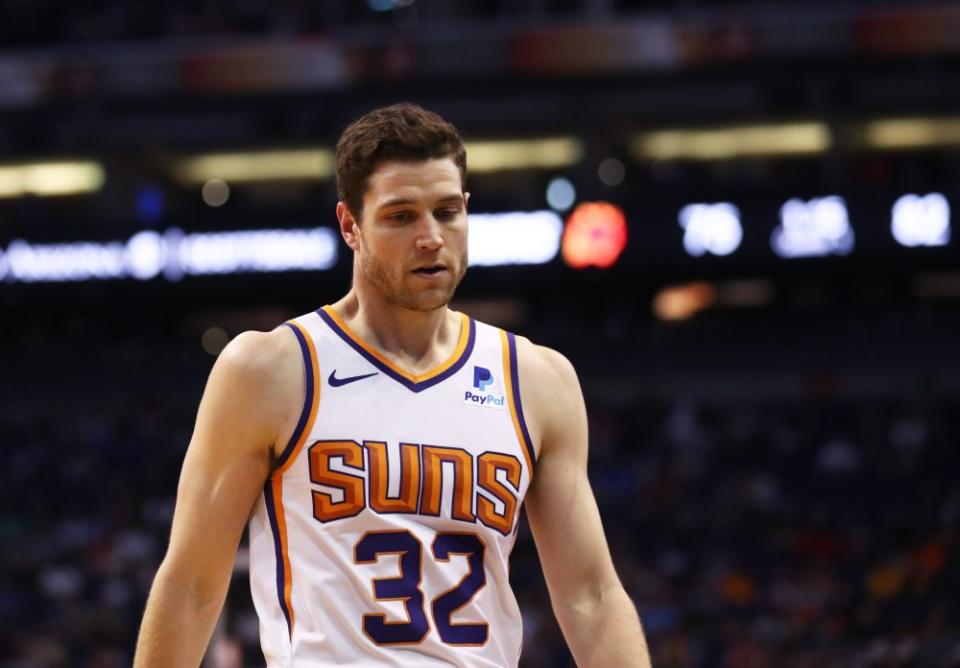
JF: I would say after my last stint in the NBA. Once I was with the Phoenix Suns at that last stint over in China and then afterwards I figured that was probably going to be it as far as NBA is concerned. With the NBA, a lot of times, they wanna go young if they’re bringing someone in. That’s someone that they can help groom and mold, especially if they’re not gonna necessarily be a guy that they’re gonna come in and just throw in and be a rotation guy, right? So I think the biggest thing is at that point, obviously, I knew I could still play and help a team, but at the same time usually that’s just the way it works.
So you can’t dwell on it. You can’t hold on to anything like that. You just have to take the opportunity that’s ahead of me and go all in on it and that’s what I’ve always been able to do. So at that point it was probably the last time that I really thought about it.
Something else to point out is how you were playing basketball in China during the pandemic. That must have been something. I’m sure going through that experience really put things into perspective in your life off the court.
JF: Yeah, for sure. I was in China playing basketball for seven months and didn’t get to see my family one time. And at that point, I was like, I don’t want to do that again. It’s unrealistic for me as a father and as a husband to do something like that when I don’t necessarily have to. So for me, that was an easy decision at that point.
You played in the league for five teams. When you were in the NBA, which team did you have the best experience with?
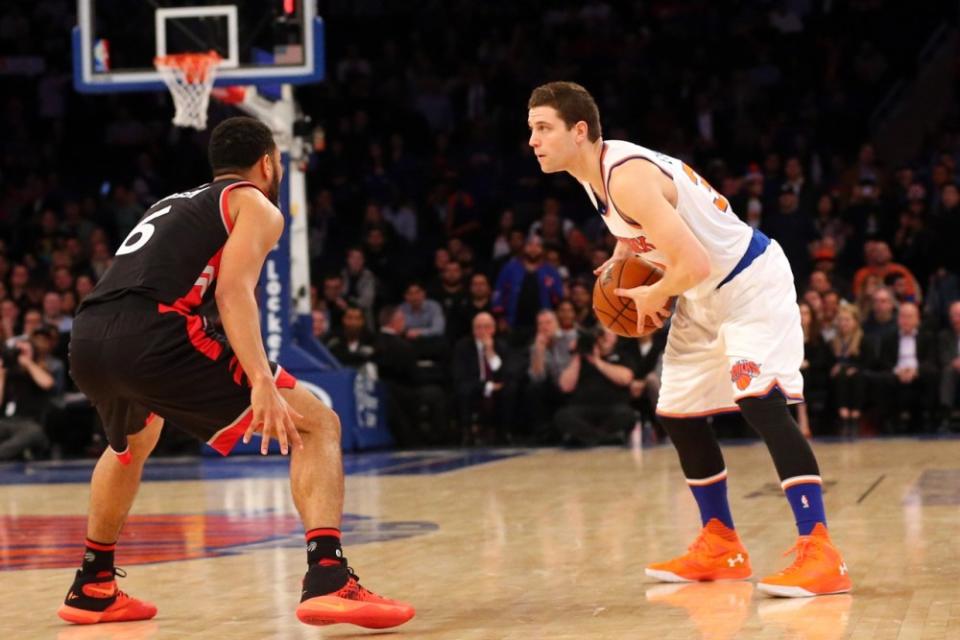
JF: It’s hard to say. I had great experiences in all different places. Obviously Sacramento, I love living in Sacramento. My family loved it there, my wife loved it there. We had such great friends. The easy community to live in and be around. It was very livable. So I love that.
The organization of the Chicago Bulls was amazing. We had a great team, obviously veterans. We had Joakim Noah and Derrick Rose and Carlos Boozer and Kirk Hinrich. They just had a lot of really great players. So that was an awesome fun experience.
New Orleans, we had a really good team, made the playoffs. We were younger but we played hard, and then to play in New York for a little bit was awesome. That’s my home state. Team that I loved growing up. So that was pretty surreal to be able to put on that jersey and to be able to go out and play in the Garden [and it] was really, really fun too.
So there’s not one particular city that you would say you had the best overall experience with?
JF: Honestly, not really. I mean they’re all pretty similar as far as fun was concerned. There were times where it was really fun, there were times where it wasn’t fun. It’s just the way it works. It’s the business of basketball. There’s some times where you’re feeling good and you’re going into practice and you’re like, man, I’m excited about this, I wanna be here and there’s other days where like, man, I don’t know if I wanna be here today. It’s just the way that the game works.
But for me, I always tried to have a positive attitude and effort, wherever it was that I am, and for me the happiness didn’t come from basketball. Happiness came from my family and my faith and all those things. And I tried to stay even keel in the same no matter what situation it was. So I just had unique opportunities in all these different places and cities and just to try to enjoy it as much as I could.
What things did you learn in the NBA that helped you play professional overseas?
JF: Well, the NBA has got the best players in the world. The size and athleticism that you’re playing against on a daily basis in practice and in the games is unlike anything you ever see. So because of that, when you play against other players they aren’t quite as athletic… they don’t quite get out to the shot as quickly as the NBA players do. So the game could slow down a little bit once you get out of the NBA type facility and arena. So I think that’s the biggest thing is that type of talent that you’re playing against is just exceptional. Not saying that other places and other guys aren’t great players because they are in Europe, it’s a much different game. But the talent level is still just different in the NBA, so it helps you just get better quickly.
What was It like playing overseas in China?
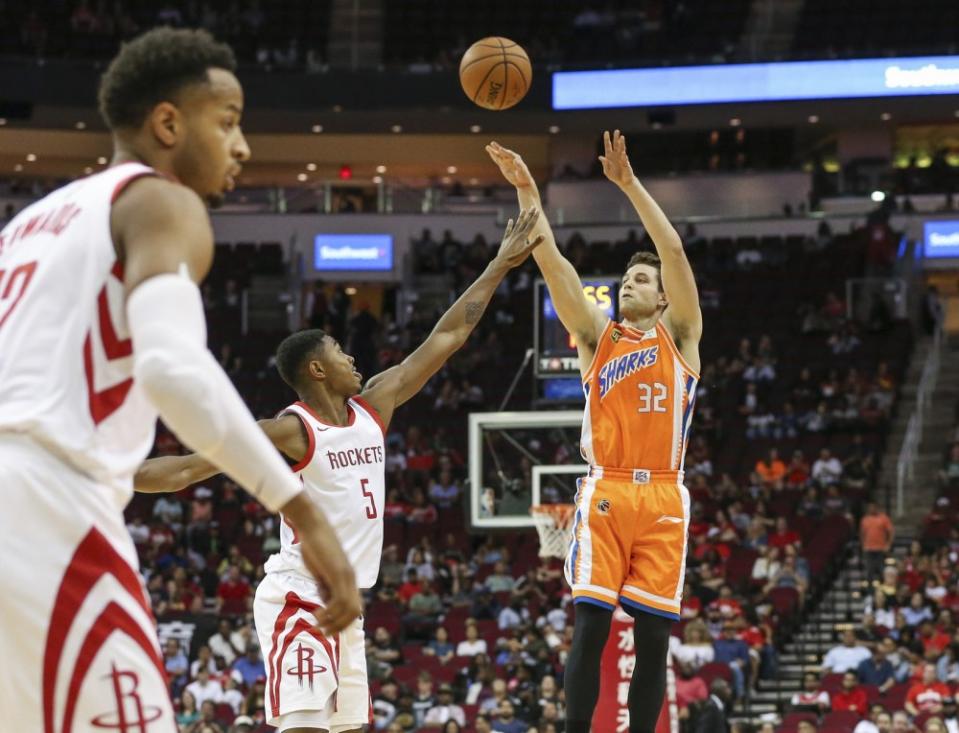
JF: Yeah, it’s very different. But they took me in as one of their own and I appreciate that by Shanghai. I was there for four years. I know that city extremely well. The people were awesome, but it’s definitely different. There’s a lot of cultural things that are different. The basketball is pretty similar. They definitely run you hard and you play hard and it’s very physical. It’s very physical being an import playing basketball in China, but the city, you gotta get used to the food, you gotta get used to the culture and all those things. But once you kind of get the hang of it and understand the different things that go on, you start to really enjoy it and try to love it for what it is.
You mentioned recently that the game now suits the way you play more. Do you ever wonder how different your career would be if you came out in this era?
JF: Of course you think about it, right? Like, I mean there’s no way that you don’t think about it. Obviously, it does fit my game better now than it did before. It’s more positionless basketball. When I came out it was like, is he a one or is he a two? What’s the deal? Who’s he gonna guard? Now it’s like if you can play, you can play and if you can shoot, you’re an asset.
So that’s something that’s important in today’s day and age. So I was definitely probably a little bit ahead of my time as far as that’s concerned. But it is what it is and right now I’m in a good spot and using my talents and been able to do it all over the place.
You just have to be able to adapt and figure out how you can make your impact elsewhere, right?
JF: Yeah, exactly. That’s what you do. Like I said, whatever the opportunity is ahead of me, I’ve always tried to dive in 100 percent and take advantage of that and be the best that I can be in that role. And then once that happens, things open up for you. That’s the biggest thing is just diving straight in and understanding that if you are doing great what you’re supposed to be doing at that point, opportunity is gonna open up for you and you’re gonna be happy with the things that you’re doing. So, I think that’s the biggest thing for me.
What sort of advice would you give younger players coming up in terms of maintaining confidence?
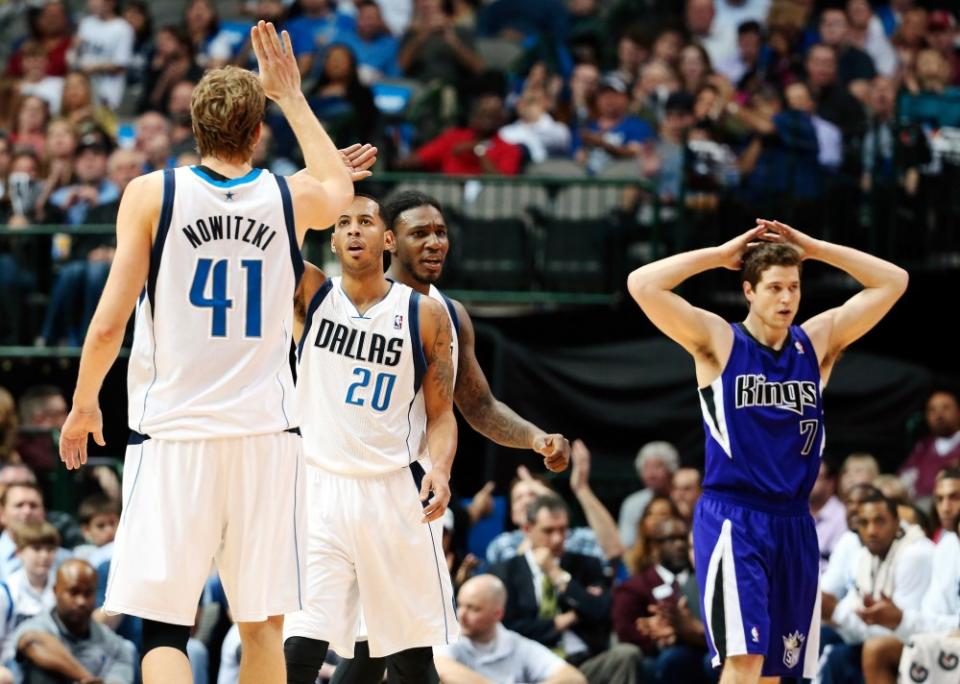
JF: It’s hard. It’s not an easy thing to do, depending on your situation. There’s certain situations where you’re gonna be as confident as ever because the coach believes in you, teammates believe in you and they’re gonna give you a green light to go out and do anything that you wanna do. And there’s other situations where it’s not necessarily like that. The coach maybe doesn’t trust you quite as much. Maybe a new player in a new system, whatever it is.
What I always try to tell kids is to do whatever you are best at because if you can be best on the floor at one thing, that’s gonna help you stand out in front of a coach and then it’s like, all right, that guy is a great rebounder and he does that at a high level. I need him on the court, whatever it is and don’t shy away from it. That’s one of the biggest things, but once you start trying to do multiple things and things that you aren’t as good at, it kind of exposes you a little bit more. So I think that’s the first thing is try to do what you’re good at. Put your best foot forward. Once you get that confidence, you get to start playing more, then you’re able to kind of develop more and do more things on the court. The coach will trust you a little bit more. So that’s where you’re gonna find your confidence is by working on those sort of things.
The players that come into the NBA are all really, really good. They pretty much played a lot in their entire careers, and they come into the league and maybe see 10 to 15 minutes or less a game. Similiar to when you first got into the NBA. In terms of a mindset, how do players stay prepared and locked in with the inconsistent playing time?
JF: Like I said it’s not easy to prepare for it, but I think some of the biggest things you could do is try to find people that are in your corner that are gonna tell you the truth. And that are gonna be supportive to you. Like you don’t always wanna have people that are just gonna tell you that, you’re the greatest or you should be doing everything that you wanna do. Like, sometimes if someone says, hey, this is what you’re gonna need to do and get in order to get on the court, then do it.
I think that’s the biggest thing is you try to do whatever you can to get on to the court when you’re a young player. Whatever it is that the coach needs, be coachable, go out and do that. If you can do that really well, like I said, you’re gonna gain the coach’s trust, and then once you gain the trust, you’re gonna get more and more influence and more opportunity. So that’s the hard thing to do. You gotta put your ego aside and just do whatever it is that’s asked. The people that do that usually are the most successful.

